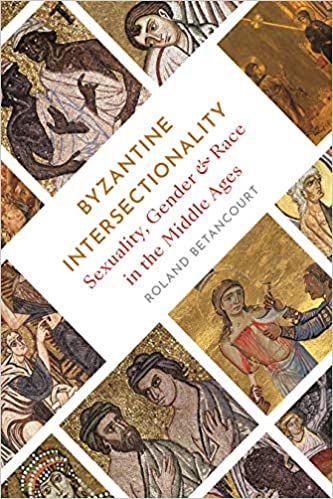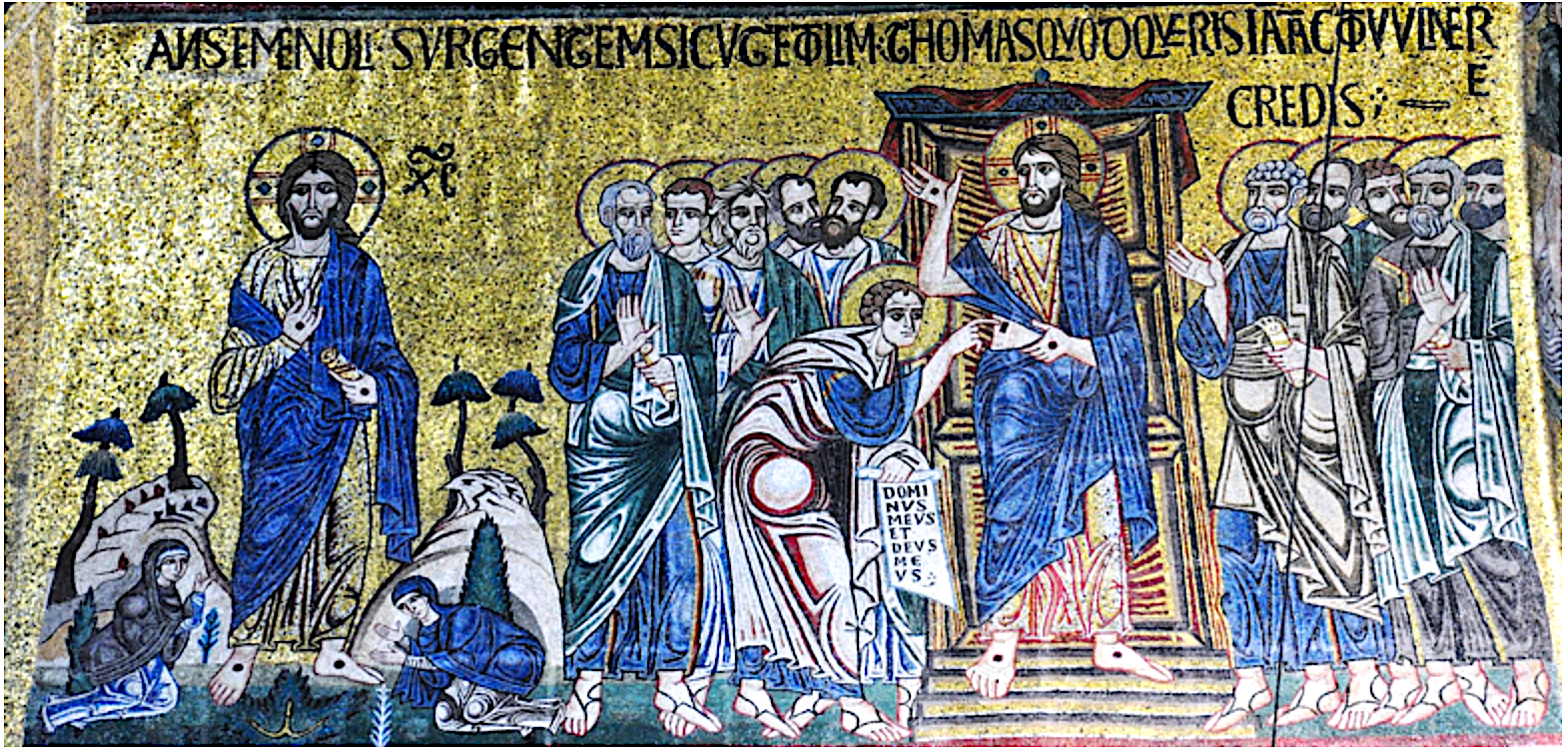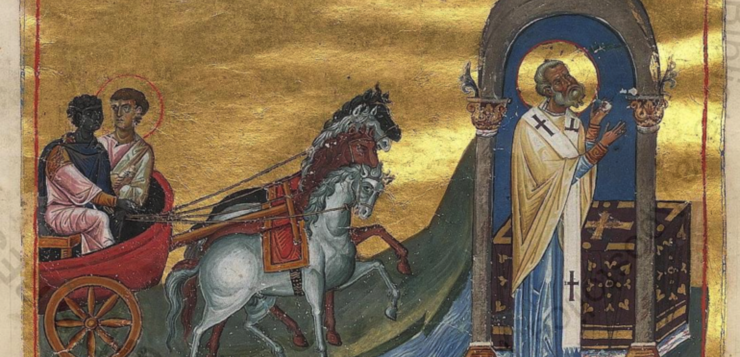 BYZANTINE INTERSECTIONALITY
BYZANTINE INTERSECTIONALITY
Sexuality, Gender, and Race in the Middle Ages
by Roland Betancourt
Princeton University Press
274 pages (illustrated), $35.
WHEN JOHN BOSWELL argued in Christianity, Social Tolerance, and Homosexuality (1980) and again in Same-Sex Unions in Pre-Modern Europe (1994) that there were “gay” monks and that the medieval Catholic church condoned and even blessed “gay marriages,” it was considered groundbreaking and controversial. One of the founders of gay studies, Boswell leveraged his postion at Yale to legitimize and institutionalize gay and lesbian studies through the three annual conferences he spearheaded there. I helped bring the fourth annual iteration to Harvard in 1990, expanding the number of speakers and the name: Lesbian, Gay and Bisexual Studies Conference. I am not an art historian or medievalist. Yet, reading Roland Betancourt’s Byzantine Intersectionality and reviewing the wealth of recent scholarship he cites, I am struck by the impact of queer studies on art scholarship, particularly in the past two decades. Not only sexuality, but also gender and race issues have become integral to historical analysis, both textual and visual.
Betancourt is further spurred by the most current political urgencies to engage in bold and challenging interpretations—just as LGBT and AIDS activist-academics did in the ’90s. He’s a professor of art history at UC-Irvine and a consummate Byzantine scholar, yet his interpretative concerns are firmly planted in the present. For example, his anthology (co-edited with Maria Taroutina) Byzantium/ Modernism: The Byzantine as Method in Modernity (2015) not only demonstrated visual æsthetic links between 20th-century modernist artwork and Byzantine art,* but also deployed contemporary critical techniques in Byzantine scholarship. The research project for his new book, Byzantine Intersectionality: Sexuality, Gender, and Race in the Middle Ages, evolved during a residency at the Institute for Advanced Study at Princeton, which he evokes in a lengthy paragraph in his acknowledgements—itself a paean to the collegial and gustatory pleasures of the life of the mind.
I have often wondered if Mary had any choice in the matter, and apparently this has been an issue for theological speculation since early Christianity in diverse texts. Betancourt examines these in relation to icons of the Annunciation. Theologians were at pains to distinguish Mary’s impregnation by the Holy Spirit (often depicted as a dove) from a rape à la Zeus in Greek mythology. Writers and artists also sought to distinguish Mary from Eve, who was blamed for the Fall. The possibility that Mary was adulterous also had to be dispelled. In the parallel passage in Matthew 1:18–21, an angel appears to Mary’s betrothed, Joseph, to reassure him that she has become pregnant not through infidelity but through the action of the Holy Spirit. Through subtle readings of both texts and images, Betancourt demonstrates the evolving depiction of Mary. She was wary of Gabriel and consciously consented to be impregnated. Only then could she be considered a worthy vessel for the Son of God. Betancourt draws a parallel to Christ’s consent to his crucifixion. Betancourt’s point is that Byzantine writers and artists (at least for theological coherence) stressed the importance of women’s consenting to sex: even God the Father must seek consent.
The second chapter, titled “Slut-Shaming an Empress,” ventures into less theological and more presentist interpretation. The 6th-century Byzantine empress Theodora is spectacularly depicted in a mosaic in the Basilica of San Vitale in Ravenna, Italy. On the facing wall is her husband, Emperor Justinian I (482–565). Under their reign, the empire expanded, there was legal reform, and the arts flourished. Both are saints in Eastern Orthodox Christianity. Theodora was reputed to be a woman of great beauty and intelligence, and she had considerable political power. Perhaps for this reason, her early history—as an actress and a sex worker—is surrounded in controversy.
Two official histories of the period by Procopius of Caesarea depict the couple as virtuous and enlightened. His History of the Wars (completed 554) covers Justinian’s expansionist wars to the east, and the wars to the west to reestablish the Roman Empire. The Buildings (561) is a courtly panegyric, probably written on command. In it, Procopius is effusive in his praise of the Emperor’s construction projects, from the Hagia Sophia to aqueducts and fortifications. He is equally flattering about Theodora. She was a powerful and trusted advisor to Justinian and a promoter of laws defending women, such as prohibiting the sex-trafficking of girls and expanding women’s divorce rights. She spurred Justinian to ruthlessly put down a rebellion in 532. Her power was such that, according to Procopius, she independently received ambassadors “as if she were in command of the Roman Empire: a thing that had never happened in all previous time.”
Procopius seems to have reserved his true feelings about the couple for his Anecdota, better known as “The Secret History.” This candid supplement to his official histories is the precursor to today’s insider, tell-all accounts of Trump White House intrigue and ineptitude. It presents a scandalous and pornographic account of Theodora’s youth as well as a scathing critique of their reign as immoral, corrupt, unscrupulous, and ruthless. He portrays Justinian and Theodora as despotic tyrants and “fiends in human form.” It was written in the late 550s and thought lost until a manuscript copy was discovered over a millennium later in the gargantuan Vatican Library. The librarian who found it promptly published it in 1623, but edited out the salacious bits about Theodora. Some have doubted the authorship, or questioned the writer’s motives. Classicist John S. Phillimore acerbically opined: “It is a bitter, malignant, and often obscene invective against all the powers of the Byzantine Church and State, apparently the tardy revenge of an ill-conditioned man of letters for a lifetime of obsequiousness.”
Procopius describes Theodora as an animal-keeper’s daughter who rose up from lascivious dancer to courtesan to empress, a power-hungry, conniving demon. She entrances Justinian (at least two decades her senior), becoming first his mistress and later his wife—thanks to an imperial edict. The Emperor plunders his realm to satisfy her greed. In her youth, her lust was insatiable with actors, youth, noblemen, their servants, even knobs on furniture! “And though she flung wide three gates to the ambassadors of Cupid,” Procopius floridly exclaims, “she lamented that nature had not similarly unlocked the straits of her bosom, that she might there have contrived a further welcome to his emissaries.” She was said to have become repeatedly pregnant, and Procopius notes that Theodora “boasted of her many abortions.”
Betancourt takes this as a Byzantine example of “slut-shaming,” like that of Monica Lewinsky. Women, particularly those in power, have been the victims of rumor, slander, and persecution for their alleged sexual improprieties. There’s a whole genre of pornographic pamphleteering on Marie Antoinette. Slut-shaming is a subset of a much broader persecution of women, and men, for engaging in stigmatized sexual practices. We all know about men and women being blackmailed, disgraced, fired, imprisoned, and killed for their sexual orientation, “promiscuous” sex, or gender presentation. Although Procopius excoriated both Theodora and Justinian for their sanguinary tyranny, it was the Empress who came under particular attack for her sexual perversity, while the feeble Justinian was portrayed as exploited due to his intemperate infatuation.

Two chapters of Byzantine Intersectionality explore homoeroticism and homosociality as evinced in texts and images related to brief episodes in the Bible: the story of “doubting Thomas” (John 20:24–29) and that of the “Ethiopian eunuch” (Acts 8:26–39). The first passage describes Jesus appearing to his disciples, who were in hiding for fear of persecution after his execution. Thomas had missed this initial appearance of Jesus and remained skeptical of the resurrection until Jesus appeared again a week later. To convince Thomas, Jesus showed him the wounds from the crucifixion, and even told him to put his hand in the chest wound made by a soldier’s spear. At this, Thomas finally declares his belief. Jesus contrasts Thomas’ need for material proof with those who simply trust in Christ: “Blessed are those who have not seen and have yet believed.” Byzantine writers expanded on this brief passage, embellishing it with fleshy and dramatic detail to emphasize how much coaxing was required from the other apostles and the sensuous goriness of the material proof Thomas required.
Betancourt points out the queerness of all-male discipleship and monasticism. He returns to the ”brother making” ceremony of spiritual union that Boswell controversially interpreted as a “same-sex union.” As with so many examples of pre-19th-century relationships, it takes a degree of wishful, ahistorical projection for us to see them as “gay.” On the other hand, gay denialists would have to overlook Church writers’ persistent condemnation of lustfulness, sodomy, and the moral perils of smooth-faced, handsome lads in a monastery. Betancourt deftly uses an abundance of Byzantine texts, hymns, and images of Doubting Thomas inserting his excitable finger (or whole hand) into the bloody opening of Christ to equate it with a homoerotic phallic insertion. His evidence is pretty compelling. Betancourt cleverly loops us back to the opening of the episode interpreted as a heroic model of homosocial community: the brotherhood of apostles fearing persecution yet collectively finding courage in their radical faith to be themselves.
A chapter on the Ethiopian eunuch is graced with the most glistening color plates. Many come from another Vatican Library treasure, the Menologion of Basil II, a luxuriously illuminated Greek manuscript produced for Byzantine Emperor Basil II (ruled 976–1025). It is an Eastern Orthodox calendar with corresponding images from the life of Christ and the lives of the saints organized by their feast days. (The volume covers half of the liturgical year; presumably a second volume was lost or never produced.) The chapter focuses on an icon depicting St. Philip and the Ethiopian eunuch lovingly staring at each other in a chariot (shown on page 15). The biblical story in Acts of the Apostles relates how an angel directed Philip to spread the gospel into the wilderness to the south of Jerusalem. On the way, Philip encounters a eunuch court official of Candace, the queen of Ethiopia. He had come to Jerusalem to worship and is in his chariot reading a passage from the book of Isaiah (53:7), which prophesies a servant who will be sacrificed like a sheep. The eunuch invites Philip into the chariot, where he uses the opportunity to evangelize—explaining that Christ is the promised Lamb of God. As they pass a river, the eunuch has Philip baptize him, whereupon the spirit of the Lord snatches Philip away and the eunuch goes on his way rejoicing.

The significance of the episode has been debated since the first centuries of Christianity, primarily as to whether it represented the first conversion of a Gentile or the universality of the Christian gospel, which was available to Africans and even eunuchs. Betancourt focuses on the dark skin color and soft features of the Ethiopian eunuch in the Menologion icon. Other depictions of this character erased his racial difference, bolstering the association of whiteness with purity and goodness. In contrast, Betancourt reviews the opposing tradition that emphasized the monstrousness and barbarity of dark-skinned people. The Menologion’s Ethiopian eunuch is clearly black, yet is richly dressed and as comely as the saintly Philip (upon whom he adoringly gazes). This image, in its uniqueness, becomes a shining example of positive Byzantine intersectionality. Racial and gendered otherness are accepted, even beloved, in Constantinople, a uniquely cosmopolitan city where Europe kisses Asia.
The chapter on “transgender monks” was, frankly, the most challenging to accept. Betancourt is aware that he’s projecting many contemporary categories onto the distant past: gender, sexuality, even race. However, as a personal identity, “trans” seems particularly difficult to map onto the Byzantine iconographic and textual evidence he provides. For example, some ascetic women, such as “Desert Mother” St. Mary of Egypt, chose isolated lives of bodily self-neglect, which—like women with malnutrition or anorexia nervosa—led to emaciation, loss of menses, and a skeletal state that appears nearly sexless. He also presents women who disguised themselves to seek refuge in monasteries—perhaps as much to escape arranged marriages as out of piety. Some hagiographies describe a number of female saints who passed as eunuchs in order to live in monasteries. Saint Agatha was martyred by having her breasts cut off.
Betancourt claims to give these diverse characters agency as transgender subjectivities, but soon admits that none of the sources provide evidence that these individuals themselves felt their gender identity did not match their natal sex. As he and scholars of many disciplines, epochs, and cultures have pointed out, we have abundant evidence of mythical and real gender transgressive dress, occupations, behaviors, and bodies. This would include same-sex relationships, affections, and copulation. It is another matter to label any of these personages as “transgender” in the woke mission to give them agency. However, Betancourt is self-critical enough of his wokeness that he does not slip into a facile Western LGBT colonialism of exotic lands.
On balance, Betancourt brings such scholarly meticulousness, theoretical sophistication, and—perhaps most importantly—political genuineness to this work that I was willing to overcome my academic dyspepsia about ahistoricism. I was reminded of the political urgency of an earlier generation of LGBT and AIDS scholars in the 1980s and ’90s. Similarly, Betancourt writes with an authentic engagement in an intersectional analysis of race, sexuality, and gender. With his scholarly and political commitment, Betancourt vividly demonstrates that the richness of Byzantium was not just in its gilded surfaces but also in its gender, racial, and sexual diversity—befitting for this crossroads of two continents and myriad cultures and religions.
* Think of Gustav Klimt’s Portrait of Adele Bloch-Bauer I (1907), known as “The Lady in Gold” (now at the Neue Galerie, New York).
Vernon Rosario is a historian of science and Associate Clinical Professor of Psychiatry at UCLA.





